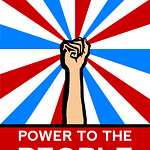vol. 3 issue 37
Greetings,
If you are white, and could speak frankly to anyone about race, what would you say?
Would you explain why reparations aren’t fair, stating that you didn’t own slaves, so your tax money shouldn’t go to pay for sins of the past?
Maybe you’d talk about how you’re not a racist, so you should not have to attend diversity, equity, and inclusivity training.
Maybe you’d say that you work hard, you played the game, you got where you are because you did what you’re supposed to do, and it’s not right to be vilified for it.
Maybe you would say other things if the landscape were framed differently.
Maybe you’d see things afresh from your own perspective, not just from that of the black community, if you understood how racism is made up in order to keep you in line.
What does the system as it is cost you? How is your life flatter, more stilted as a result of being distracted into defending yourself against being a racist when what is really happening is something else, something far more pervasive, even if less visible?
That’s why I think this conversation between author and diversity, equity, and inclusivity (DEI) consultant, Dax-Devlon Ross, and myself is important, and perhaps even imperative.
Because: it’s about you.
This podcast starts out with me introducing Dax just like I would any other guest. Then it immediately goes off script into unplanned places after I unthinkingly use the word “ghetto”.
We don’t talk about his book at all, we talk about what it’s like to be a black man and a white woman, and the expectations upon us respectively. We talk about how we see the way what we’re taught gets in the way of seeing not just each other, but ourselves.
I have written critically before about DEI training because I think it’s just more of the same old, same old bull puckey of being told what to think and how to act. I have had enough of that, thank you.










